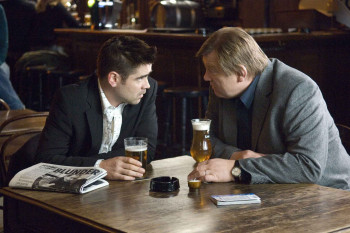In Bruges
 Early in In Bruges, the hit man Ken (Brendan Gleeson) is counting out coins, and he ends up 10 cents short of the admission price for a historic attraction. He pleads with the cashier to let him in, but the man insists that it costs five euros to get in. Exasperated, Ken pulls out a 50-euro bill.
Early in In Bruges, the hit man Ken (Brendan Gleeson) is counting out coins, and he ends up 10 cents short of the admission price for a historic attraction. He pleads with the cashier to let him in, but the man insists that it costs five euros to get in. Exasperated, Ken pulls out a 50-euro bill.
It’s a tantalizing bit of character color. But when that detail becomes important late in the movie, the life gets sucks out of it; it becomes a hollow contrivance instead of an ambiguous hint of a man.
That happens a lot in Martin McDonagh’s In Bruges, which despite its pedigree and charm (and good reviews) was barely given a release in the United States – topping out at 232 theaters. It takes some little detour that looks and feels irrelevant initially but is finally an essential component of the machine that is the plot. Those coins. The tower. A cigarette. The dwarf. A choice of bullets. The movie that’s being filmed in Bruges. The dwarf’s outfit. Even early references to karate pay off.
In Bruges is a model of narrative economy, occasionally for better but mostly for worse. The effect of a story in which all the pieces matter is that it’s drained of its humanity. Writer/director McDonagh reveals himself as the puppet master when all these eccentric loose ends start getting tied up. In Bruges might best be described as “neat,” when what it needs is a little messiness. The intrusive authorial presence ensures that we pay more attention to the storytelling than the story, and to characters rather than people.
After a job with … complications in London, Ken and Ray (Colin Farrell) are sent to Bruges, Belgium, to let things cool down and await further instructions from their boss, Harry. They’re supposed to act like tourists, and Ken does quite nicely, taking in Europe’s best-preserved medieval city. Ray, however, is itchy, and gets into an altercation with some American tourists, lands a date with a pretty woman from a film set, and on that date gets in a physical fight with the couple at the next table.
These things could all be throw-away details, but they’re not. Ray warns the tourists not to climb up the tower because they’re “a bunch of fucking elephants,” which sets up the tower being closed later in the movie … . The date has an ex-boyfriend with whom she robs tourists, which gets Ray a gun and an enemy … . The fight thwarts Ray’s escape from Bruges, which is important because … well, the plot requires that Ray can’t leave Bruges.
Neat, neat, neat. That’s all fine for absurd comedy – Larry David’s Curb Your Enthusiasm is particularly adept at cleverly integrating nearly forgotten business from earlier in the episode or the season – but In Bruges isn’t a comedy. It’s often funny, but its body count, its earnest concern with guilt, and Carter Burwell’s score belie the movie’s marketing as a hilarious crime caper. (If you’ve seen the trailer, it does the movie wrong in ways too numerous to mention, the most egregious being creating an expectation for the scene that is the climax. For a movie that is already too precise and clean, you don’t need something else pulling you out of the experience.)
The comedy is often sharp, but it’s typically tinged with blood. There’s a priceless moment when Ray has two guns pointed at his head – one that he’s holding, and one that Ken’s holding – that is silly, sad, sweet, and true. And a phone conversation between Ken and Harry reveals kindness, insanity, and an authentic lack of empathy – the certainty that everybody else would want the same vacation as Harry. (As you might expect from a playwright, McDonagh’s dialogue often sparkles, and he’s clear without being blunt.)
The ever-anxious Farrell plays Ray pretty broadly, but he’s written pretty broadly, while Gleeson injects Ken with fatigue and resignation and annoyance that are leavened with a genuine curiosity about the world. That he enjoys being a tourist makes him real in a way most of In Bruges is not: There are elements of his personality that are not integral to the plot.

